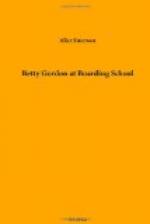“I can add—with the use of my fingers—and subtract and divide and multiply—at least I know the tables up through the twelves. Of what use will a’s and b’s and x’s, y’s and z’s ever be to me?”
“Constance, you know that’s nonsense,” Bobby told her. “We’re every one of us here because we want to play a bigger part in life than the two-plus-two-is-four people, and we’ve got to dig in and prepare ourselves. If you’d do your work when you ought to, you wouldn’t be in such an upset state now.”
“Yes’m,” grinned Constance, and went back to her belated work.
Betty had found that her year away from school had made it hard for her to concentrate her mind on her studies, and while she had not deliberately neglected her work, as Constance had in her algebra, she had not always kept up to the highest pitch. She was working furiously now, with the tests to face so soon, and with it went the resolve to be more studious from day to day during the rest of the school year. The concentration was becoming easier, too, as the term advanced, and, the teaching at Shadyside being of the best, she felt sure she would feel that she had accomplished something by the end of the year.
The Dramatic Club of Shadyside woke to ambition as the term progressed. Soon after the mid-term tests, which all the girls, even Constance, passed successfully, by dint of threat and bribery, each student was “tried out” and her ability duly catalogued.
Betty liked to act, and proved to have a natural talent, while Bobby, professing a great love for things theatrical, was hopeless on the stage. Her efforts either moved her coaches to helpless laughter or caused them to retire in indignant tears.
“She is—what you call it?—impossible!” sighed Madame, the French teacher, shaking her head after witnessing one rehearsal in which Bobby, as the villain, had convulsed the actors as well as the student audience.
“Well then, I’ll be a stage hand,” declared Bobby, whose feelings were impervious to slights. “I’m going to have something to do with this play!”
Ada Nansen was eager to be assigned a part—the players were chosen on merit—and she aspired modestly to the leading role, mainly because, the girls hinted, the heroine wore a red velvet dress with a train and a string of pearls.
But Ada, it developed, was worse than Bobby as an actress. She was self-conscious, impatient of correction, and so arrogant toward the other players that even gentle Alice Guerin was roused to retort.
“I haven’t been assigned the maid’s part yet!” she flashed, when Ada ordered her to remove several stage properties that were in the way.
“Give it to her, Alice!” encouraged the mischievous Bobby. “That girl would ruffle an angel.”
Alice and Norma were both valuable additions to the Dramatic Club ranks. Norma especially proved to be a find, and she was given the hero’s part after the first rehearsal while Alice was the heroine’s mother. Betty, much to her surprise, was posted on the bulletin board as the “leading lady.”




